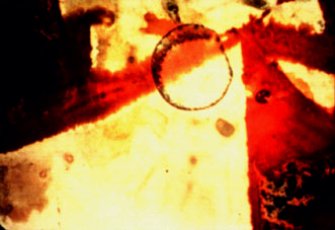Harry Smith
Nato nel 1923 a New York, Harry Smith è stato recentemente definito dalla rivista-bibbia per gli ascoltatori delle sonorità di ricerca The Wire “… one of the great polymaths of occult folklore” (n. 196, ottima referenza bibliografica). Smith è riconosciuto nell’ambito musicale per la sua The Anthology of American Folk Music (di cui è stato recentemente pubblicato in Cd il quarto volume) fonte sonora straordinaria di un repertorio di cultura materiale-“immateriale” intimamente legato alla storia degli Stati Uniti e delle molte culture che li hanno attraversati oltre a quelle native. Quest’opera immensa, repertorio sotterraneo campionato da anni dai migliori fra i dj e produttori di musica elettronica, non è che una delle multiformi attività ed esperienze di ricerca ed espressione del polimorfo, trasversale ed eclettico, Harry Smith. Smith è peraltro in effetti uno degli autori cruciali della storia dell’immagine del XX secolo, identificabile in quella nicchia della ricerca fra cinema underground, sperimentale e di animazione, nicchia in cui però reali compagni di strada erano pur sempre Kenneth Anger, Jonas Mekas, Robert Frank, Andy Warhol e Jack Smith. Il lavoro filmico di Smith è idealmente fondato sull’automatismo, secondo metodologie e approcci combinatori che, come dirà Ginsberg a Smith stesso, W. Burroughs stava utilizzando nel medesimo periodo nella sua personale rielaborazione delle tecniche creative surrealiste. Partendo dal presupposto che le azioni compiute non fossero semplicemente arbitrarie ma avvenissero per sortilegio, Smith ha prodotto anche in campo visivo una messe di materiali esoterici ed inclassificabili spesso senza né capo né coda, in versioni ridotte, ricomposte o mutile.
Filmmaker, musician, painter, mystic and string collector, Harry Smith wore many hats during his long, eventful life as a key figure of underground culture through the latter half of the 20th century. In this jubilant documentary, director Rani Singh hones in on Smith's incalculably influential Anthology of American Folk Music, a remarkable and enduring collection of blues and country classics recorded by the likes of Blind Lemon Jefferson, Roscoe Holcolmb, the Carter Family and the Memphis Jug Band between 1927 and 1934. Smith, an insatiable amateur musicologist, picked up these rare recordings while still in high school, eventually amassing a collection of more than 8,000 "round black ghosts" (in the words of Smith aficionado Greil Marcus) and releasing the best of the bunch on his Anthology in 1959. Singer/songwriter Bob Neuwirth notes that these songs are about "life, death, blood, betrayal, murder, intoxication" and every one of the seven deadly sins. Upon the collection's rerelease in 1997, music tribute impresario Hal Wilner organized a series of concerts featuring some of today's most gifted artists taking a crack at their favorite Anthology tracks. Singh has assembled concert footage, interviews and archival images into a fittingly celebratory, rockin' doc. Transcendent performances by Beth Orton, DJ Spooky, Sonic Youth, Kate and Anna McGarrigle, Lou Reed, Philip Glass, Richard Thompson, Emmylou Harris, Beck and Nick Cave highlight the proceedings, and just wait until you hear Elvis Costello tear into "The Butcher Boy." The Old, Weird America is a testament to Smith's impeccable taste in music and that music's enduring appeal and relevance. As Marcus says, " The weirdness means the story will always be new."

